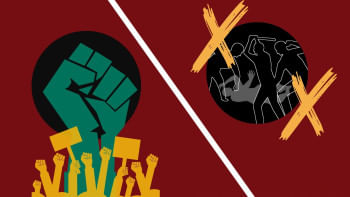This madness will be our undoing

We are deeply alarmed by the recent incidents of mob justice in some prominent public universities that claimed three lives, two of them within hours of each other on Wednesday night. These killings, by students no less, mark an escalation in a whole catalogue of violence and subversion that generally characterised the post-August 5 period. The breakdown of law and order, amid little field presence of police officers, has already forced the administration to grant magistracy powers to army officers so that they can intervene decisively to restore order. But that the malaise goes beyond a mere crisis of law enforcement is getting increasingly clear.
The case at Dhaka University's Fazlul Huq Muslim Hall, where a man identified as Tofazzal was beaten to death on mere suspicion of theft, is a chilling example of this. Despite being reportedly mentally unwell, he was subjected to hours of torture by students. A similar tragedy unfolded at Jahangirnagar University, where a former Chhatra League leader, Shamim Ahmed, was fatally beaten by students. The third case involved Abdullah Al Masud, another former Chhatra League leader at Rajshahi University. It happened on September 7 when Masud was mercilessly beaten before he was taken to a local police station and then to the hospital, where he died from his injuries.
These are not the first incidents of mob violence after August 5. In fact, according to an estimate, incidents of mob lynching led to some 21 people being killed over the last 38 days. But this happening in the highest seats of learning, at the hands of our brightest students, who not long ago rescued the nation from the grips of an authoritarian regime, makes one wonder where it all went wrong. The brutality that was on display is unthinkable. The question here is not just about universities becoming hotbeds of mob violence. The idea that it's alright to take the law into one's own hands to punish some perceived wrongdoing may have found a similar expression before the regime change, but its continuation now suggests a crisis that cannot be resolved overnight or through law enforcement measures alone.
It needs a critical rethink about the transformation of an increasingly radicalised society, the loss of faith caused by the failure of vital institutions like the judiciary and police, the cultivation of hate, distrust, and self-serving interests, and a growing belief that change only comes through force. While reversing this thought process will require a sustained campaign of education, awareness, and civic engagement, what the authorities can—and must—do now is ensure accountability for those involved in mob violence and restore faith in the justice system through proper reforms. Mob justice is just murder under the guise of collective action. It will happen again if we don't hold to account these murderers, regardless of their identity.


 For all latest news, follow The Daily Star's Google News channel.
For all latest news, follow The Daily Star's Google News channel. 









Comments